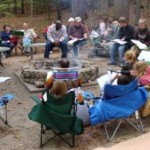un-loving one another
Believe it or not, the “one another” chain blog is still going strong – although it has slowed down slightly.
The “one another” chain blog started over two months ago with my post “Chain blog: One Another.” Since then, 17 bloggers have written 21 posts on the topic of “one another.”
If you’re interested, I’ve linked to and provided a short blurb for each “link” in the chain in my post called “Blog with One Another: A Chain Blog Update.” (I keep that post updated as new links are added to the chain blog.)
The posts in the chain blog have covered many different aspects of the various “one another” passages in Scripture. Some of them have been more theoretical and some have been more practical. Of course, all of them are practical, because living for “one another” is extremely practical.
I want to highlight the last two posts in the chain, because they focus on “un-loving one another” or choosing who to love.
First, there’s Dan’s post “love: a ‘one another’ comic.” As the title indicates, Dan’s post is actually a comic. Who do we love? Do we get to choose who to love? If so, then “love one another” is quite doable. But, if we don’t get to choose who to love, then “love one another” becomes absolutely impossible… at lest it’s humanly impossible.
Then, there’s the latest post in the chain blog. It was written by Rob, and it’s called “I Can Only Love You If…” After asking us to consider who we love, Rob says:
You might be thinking, “Shucks, that’s a high standard! Only God can be like that!” Exactly, the unconditional love for one another in the body of Christ and for people in the world can only come from God. It’s the fruit of the Spirit.
Yes, that’s the point, isn’t it!
If you haven’t yet, I hope you’ll read the various posts in the chain blog. Like I said, there are some really good posts there.
And, while you’re at it, why not write the next link post in the chain? Just jump over the last post and leave a comment saying that you’re going to write another post in the chain.
To know the love of Christ that surpasses knowledge
If you’ve read this blog over the last few weeks, then you know that we’re currently studying Ephesians together when we gather on Sunday mornings. So far, we’ve made it through chapter 3, finishing that chapter last weekend.
I almost didn’t get together with the church yesterday morning. I’d been sick for a few days, and earlier that morning I had spent a couple of hour with my daughter at a race. We had been asked to write a story and take photos for the local paper.
Although we had alot of fun at the race, when I left I just wanted to climb in bed and sleep. But, at the last minute, I decided to go along with my family. Plus, the ham and bean soup that Margaret had made to share with our friends smelled delicious, and I was ready to dig into it.
I spent most of the morning listening… which is strange for me. I like to talk, and often I talk too much. Yesterday morning, I listened. I didn’t even feel like singing, mostly because my throat was a little scratchy.
Whenever I listen, I learn… and this time was no different. I loved hearing my brothers and sisters summarize the first couple of chapters of Ephesians and then work their way through Paul’s prayer at the end of Chapter 3:
For this reason I bow my knees before the Father, from whom every family in heaven and on earth is named, that according to the riches of his glory he may grant you to be strengthened with power through his Spirit in your inner being, so that Christ may dwell in your hearts through faith—that you, being rooted and grounded in love, may have strength to comprehend with all the saints what is the breadth and length and height and depth, and to know the love of Christ that surpasses knowledge, that you may be filled with all the fullness of God. Now to him who is able to do far more abundantly than all that we ask or think, according to the power at work within us, to him be glory in the church and in Christ Jesus throughout all generations, forever and ever. Amen. (Ephesians 3:14-21 ESV)
At one point, one of my good friends made a statement about a phrase in Ephesians 3:19 – “to know the love of Christ that surpasses knowledge.” Paul prays that the Ephesians have the power to know something that cannot be known. That “something,” of course, is the love of Christ. Paul wants them to know the love of Christ, and says that the love of Christ is beyond knowing.
This led to a great discussion, and, apparently, quite a bit of meditation and thought for several of us. I, for one, am glad that I was not able to speak as much as normal. It gave me the opportunity to think more about this… to think more about something that can’t be thought about.
The love of Christ is something that we are to know… to think about… to live. And, yet, we will never know it.
Learning how to love your neighbors in a new culture
My friends Paul and Laurel moved to the Congo a few months ago. If you’ve heard anything about the Congo in the news lately, they’re in the area of that country that has experienced an ebola outbreak recently.
Recently, they wrote about learning how to love their neighbors in that new culture. They published their thoughts on their blog in a post called “Building relationships in a new culture: Freely go and visit.”
Responding to something they read in a book, they write:
He said that for Westerners, we usually seek to build relationships by inviting people over for a set date and time. We do this a few times and feel like we’re getting to know someone. However, he explains, that in an African culture, that would be out of place for us to do as the visitor. Good to know! Instead, he says it is totally appropriate to drop in, unannounced at someone’s house to spend an undetermined amount of time with a person and their family. If it’s around a mealtime then you would just share in that meal with them. If they had other plans then they would just cancel them! This is how the author encourages Westerners to pursue relationship building in an African cultural context. It’s hard to imagine from my Western point of view because we would usually feel so put out if someone stopped by, especially at a mealtime!
They have made it a personal goal to go against their own inclinations and tendencies and to drop in on their neighbors occasionally.
Now, I realize that most of my readers do not live in Africa. But, do you know your neighbors well enough to know how to show God’s love to them? Have you ever thought that your tendencies may seem rude to your neighbors? And, what they do that seems rude to you may not seem rude to them?
Have you ever gone against your own tendencies or habits in order to show someone that you cared about them?
Replay: Living doctrine at the campsite
Three and a half years ago, I wrote a post called “Living doctrine at the campsite.” When I wrote that post, we had just spend a weekend camping together with the church. As you can imagine, we spent alot of time together, did alot of different things together, and even talked about alot of Scripture together. At one point, we talked about Acts 2:42 together, and I realized that we had been living that passage during our camping weekend. The weekend with our brothers and sisters reminded me of the important connection between doctrine and community.
———————————–
Living doctrine at the campsite
This weekend, we went camping with the church. Friday evening, several families camped near Falls Lake. A couple of families joined us around the campfire Friday night. The next day, one family had to leave, but two more families camped with us. Several people joined us during the day on Saturday to spend time together at the campsite.
Sunday morning, many people who did not camp came to the campsite to meet together. We sat around the campfire (well, the remains of the campfire), and talked and sang and prayed. We talked about several different topics, but at one point, the discussion turned to Acts 2:42:
And they devoted themselves to the apostles’ teaching and fellowship, to the breaking of bread and the prayers. (Acts 2:42 ESV)
According to this passage, the early church in Jerusalem devoted themselves to the apostle’s teaching (or doctrine). We talked about how the church often interprets this phrase as “they spent time listening to the apostles teach”. But, as many people pointed out, this simply sentence goes far beyond listening to someone teach.
Yes, the early church continued steadfastly in the apostles’ doctrine, but they did not do this with their ears only; they continued in their lives. They lived what the apostles were teaching them.
As I was listening to my friends sitting around the campfire helping one another understand what it means to live out the doctrine of the apostles, I couldn’t help but remember the previous 48 hours that I had spend with many of my brothers and sisters in Christ. You see, I heard what they were saying Sunday morning, but Friday night and all day Saturday, I SAW them continuing steadfastly in the teachings of the apostles.
It’s one thing to hear someone encourage others to confess their sins, but it’s another thing altogether to have a brother confess his sins to you. It’s one thing to hear an exhortation to love one another, but it’s another thing altogether to see brothers and sisters who want to spend time with one another, who share their food with one another, who help one another around the campsite, who SHOW their love for one another.
As I sat around that campfire Sunday morning, I couldn’t help but praise God for the blessing of community – not community in name only, but true community – a family who loves one and cares for one another. We’re not perfect, and we’re continually seeking to grow closer to God and to one another, but we are a community.
It’s easy to see now why Luke connected “the apostles’ teaching” and “fellowship”. I don’t think you can have one without the other.
(If you’re interested, I’ve posted pictures from our camping weekend on our family blog and in a facebook photo album.)
When you have nothing left to give…
In the last few weeks, I’ve had several good, encouraging, challenging conversations with some brothers and sisters in Christ who are seeking to follow Jesus as he leads them to give to and serve others. I’m not just talking about giving out money to people in need; I’m talking about spending time with people that God brings into their life, helping them with various life issues as well as helping them follow Jesus.
These friends have each shared examples of times when God has allowed them to greatly help other people. Sometimes, they were helping other brothers and sisters in Christ, and sometimes they were loving on and serving people who were not (yet) followers of Jesus. They were encouraged and humbled by the fact that God was using them in ways that are often surprising and unexpected.
But, occasionally, my friends also shared another concern: there are so many people who need help, and my friends do not always have the money, time, energy, resources, etc. to help them.
Now, there are many different reasons for this kind of feeling, and I don’t want to get into all of those reasons. Instead, I’m hoping that this post will be an encouragement to those who find themselves in a similar situation.
First, I want to thank for giving of yourselves in this ways. You are demonstrating the love of God, as John described here:
By this we know love, that he laid down his life for us, and we ought to lay down our lives for the brothers. But if anyone has the world’s goods and sees his brother in need, yet closes his heart against him, how does God’s love abide in him? Little children, let us not love in word or talk but in deed and in truth. (1 John 3:16-18 ESV)
When we give to others who are in need, the love of God is abiding in us, and we are loving in deed and in truth.
Second, please notice something that John wrote above, “But if anyone has the world’s goods and sees his brother in need…”
You are not responsible for giving something that you do not have. This is very difficult for people who spend so much of their money, time, energy, and resources helping others. But, when the money, time, energy, and resources are gone – when you truly have nothing left to give – then you are not withholding the love of God when you do not give to someone.
Of course, even though I say that – and even though John makes the point clear in the passage above – it’s still difficult to accept. Why? Because we still know that people are in need and because we still want to help them.
But, remember, God loves these people much more than you do. He has more resources than you have. Do not allow anyone or anything (not even yourself) to lay guilt on you for not helping someone when you have nothing to give.
In Jesus’ name, share what he has given you in order to demonstrate the love that God has lavished on you. And, accept that if God has not given you anything to share with others, then he does not want you to share anything with them.
Guest Blogger: Being the Church to the Community Around Us
I’ve invited people to write “guest blog posts” for this blog. There are several reasons for this: 1) To offer different perspectives. 2) To generate even more discussion and conversation between blogs. 3) To introduce other bloggers to my readers.
(If you are interested in writing a guest blog post, please contact me at aknox[at]sebts[dot]com.)
Today’s post was written by Allen Madding. You can connect with Allen via his blog or Twitter (@allenmadding). Also, check out Feed the Hungry Forsyth at their website, Twitter (@feedforsyth), or Facebook.
——————————————-
Being the Church to the Community Around Us
For years the Church has gotten a bad rap for building a grandiose cathedral and expecting the lost and hurting to come to them. When the lost and hurting does not respond, committees are formed to try to figure out why. And when the Church contemplated service, they looked overseas – raised money, bought plane tickets and travelled thousands of miles away completely overlooking the hurting in the community that surrounded them. So the hurting in the community became skeptical of the Church and its motives. And who could blame them? If you were hungry and the Church walked by you every day and pretended not to notice you, would you trust them? If you were homeless and the Church turned a blind eye to you, would you trust them? How receptive would you be to someone explaining the gift of salvation to you if you had not had a meal in weeks and did not have a dry place to sleep? How could you accept the message that God is love and God loves you when you felt like his people did not care about you?
Although we live in one of the wealthiest countries in the world, 13 percent of those living in the United States live in poverty. One in four or 16.7 million children in the United States live in a household that does not know where the next meal is coming from – a situation we refer to as food insecurity. More than 49 million Americans, roughly 14.6 percent of the U.S., regularly face food insecurity.
What is the Church’s role in this situation? I believe we are called to open our hands and turn loose of the blessings we hold so tight. Instead of spending every dollar we make on a bigger house, fancier kitchens, a nicer foreign car, and a bigger flat screen, maybe we should pair down our lifestyles and bless the hurting.
What does the Bible say?
“The generous will themselves be blessed,
for they share their food with the poor.” Proverbs 22:9
John answered, “Anyone who has two shirts should share with the one who has none, and anyone who has food should do the same.” Luke 3:11
“From everyone who has been given much, much will be demanded; and from the one who has been entrusted with much, much more will be asked.” Luke 12:48
Mother Teresa put it like this, “When a poor person dies of hunger, it has not happened because God did not take care of him or her. It has happened because neither you nor I wanted to give that person what he or she needed.”
So how do we respond? First we have to open our eyes to the needs in the community around us. Once we recognize the need, we need to ask how we can make a long-term response. Handing a hungry man a sandwich is good. But in six hours, he will be hungry again. Providing a hungry family a week’s worth of groceries once a week is a better answer. Finally, the Church does not have to create another program or ministry. It would be far better to seek out the nonprofits in the community that are struggling to respond to the need and provide them with financial support and an army of volunteers.
Responding to the needs in the community is not optional. The Church is called to respond. Jesus said, “Whatever you did for one of the least of these brothers and sisters of mine, you did for me.” (Matthew 25:40)
Make a Difference!
When it comes to giving to others, why do we usually seem to start with reasons to not give?
I don’t know about you, but I’ve enjoyed following Chuck on his newish blog “Being Filled” (and, of course, I’ve enjoyed his interactive here and on Twitter). One of his latest posts is called “Give to Everyone Who Asks of You.”
Whenever I hear someone teach about this subject (or read someone who has written about this subject) they almost always begin with exceptions for giving or justifications for not giving. Interestingly, Chuck deals with many of these excuses in his own post.
For example, concerning the excuse “he doesn’t deserve it,” Chuck writes:
You’re right; he doesn’t deserve it. You don’t deserve it either. What you have is not the result of your own careful planning and managing. Everything you have is a gift of God. And God has just commanded you to pass some of that gift on to another undeserving person.
Chuck covers several other excuses as well.
But, I’m not concerned so much with the excuses and whether or not they are justified. But, when I read Chuck’s post, and went back and read Jesus’ command in context, I noticed something:
In every instance in Scripture where it is recorded that Jesus commanded “Give to everyone who asks of you,” he said that in the context of loving our enemies. Think about that… Jesus is talking about giving to people who oppose us… and giving them anything they ask from us. (There are other commands and examples of giving to people who are not our enemies, but this context was about giving to enemies.)
Again, I’m not interested in when, where, why, and how we may or may not be justified to not give, I’m simply pointing out that when Jesus commanded us to give, he was not talking about giving to people who agree with us or even to people who like us.
This is certainly a different kind of giving… If Jesus began in the context of enemies, why do we typically begin with reasons not to give?
Replay: I desire mercy, and not sacrifice
Four years ago, we were studying the Gospel of Matthew together on Sunday mornings when we gathered with the church. During that time and in response to part of that study and discussion, I wrote a post called “Mercy not Sacrifice.” The title of that post (and this replay, of course) comes from Matthew 9 (and Hosea 6). God commanded his people to offer sacrifices, but both the prophet Hosea and Jesus said that God did not want their sacrifices. huh? God desires mercy and not the sacrifices? Yes. God desires for us to show love to others more than doing everything just right? Yes.
———————————–
Mercy not Sacrifice
Next Sunday, we’ll be studying Matthew 9:9-13. I’m not scheduled to teach, but I’m continuing to study along in case God teaches me something that would transform my own life and perhaps that he would want me to share with others in order to build them up toward maturity in Christ. Here is the passage:
As Jesus passed on from there, he saw a man called Matthew sitting at the tax booth, and he said to him, “Follow me.” And he rose and followed him. And as Jesus reclined at table in the house, behold, many tax collectors and sinners came and were reclining with Jesus and his disciples. And when the Pharisees saw this, they said to his disciples, “Why does your teacher eat with tax collectors and sinners?” But when he heard it, he said, “Those who are well have no need of a physician, but those who are sick. Go and learn what this means, ‘I desire mercy, and not sacrifice.’ For I came not to call the righteous, but sinners.” (Matthew 9:9-13 ESV)
The quotation, “I desire mercy, and not sacrifice”, is from Hosea 6:
What shall I do with you, O Ephraim? What shall I do with you, O Judah? Your love is like a morning cloud, like the dew that goes early away. Therefore I have hewn them by the prophets; I have slain them by the words of my mouth, and my judgment goes forth as the light. For I desire steadfast love [mercy] and not sacrifice, the knowledge of God rather than burnt offerings. But like Adam they transgressed the covenant; there they dealt faithlessly with me. (Hosea 6:4-7 ESV)
For the children of Israel during Hosea’s time and for the Pharisees of Jesus’ time, following God meant offering sacrifices and attending religious festivals as well as living according to the law. But for all their sacrifices and attendance and law keeping, Jesus (and God through the prophet Hosea) says that they were actually “transgressing the covenant”. They had forgotten about mercy.
In Matthew 9:9-13, Jesus is eating with Matthew and some of his tax collecting friends. The Pharisees were appalled that Jesus would eat with that kind of low life scum. Everyone knew that tax collectors were cheaters and traitors – sinners. That is why the Pharisees would have nothing to do with them.
Jesus knew the deplorable nature of the tax collectors also. That is why Jesus spent time with them. Thus, Jesus turns the world upside down. The righteous one spends his time with the unrighteous, because it is more important for God’s people to offer mercy to others than to offer sacrifices to God (without mercy). The sacrifices and offerings and feasts and rituals meant nothing to God if the people were not also dealing mercifully with others.
The religious leaders of Jesus’ day were always getting mad at Jesus for hanging out with people like tax collectors and prostitutes and drunkards and lepers and others of an unsavory sort. He spent so much time with them, that the religious leaders started saying the Jesus was a glutton and a drunkard. But, Jesus knew that these were the people who most needed the love and mercy of God. These were the people who needed a true demonstration of God’s grace.
Today, there are many, many people who need a true demonstrate of God’s grace. They need to know the love and mercy of God. And, God’s children are the only ones who can demonstrate God’s grace, mercy, and love to them.
God desires for us to demonstrate his mercy more than we care about our religious gatherings and exercises. Which do we care more about?
She died in the church and was buried along with her name. Nobody came.
The title of this post comes from the same song that Robert (from “Abnormal Anabaptist“) used in the title of his post “All the lonely people, where do they all come from.”
In his post, Robert is thinking about the lonely people in this world – people all around us. And, they really are all around us. If we take the time to pay attention, we’ll see them everywhere.
At one point, Robert writes about a time he began to notice the “lonely people” while he was in the Emergency Room with his daughter:
First, we were alone. We sat there, my daughter and I, and no one interacted with us, really. Now, the receptionist dude at the desk took pity, offered a coloring book and a blanket to my daughter while we waited, but that was his job. And, he was busy so couldn’t dedicate much time to us.
Secondly, we weren’t the only ones alone. I saw children coming in with bruises and broken bones, people with injuries from car accidents, alcohol poisoning and/or a drug OD, fevers, illnesses, injuries, etc. And they all sat in their own little corners. No one talked to them. No one listened to them. No one showed any sense of compassion and humanity to them. “All the lonely people, where do they all come from.”
Interestingly, love and concern for others is the first fruit of the Holy Spirit that Paul mentions. It is the “royal law” according to James. It is a demonstration that we truly love God, according to John. It is the most basic responses of a person who is following Jesus, indwelled by the Holy Spirit, and submitting to God’s will in his/her life.
In spite of love being the most basic response, every author of the New Testament books found it necessary to exhort their readers toward love. Love is the most basic response to God, but also one of the most difficult to follow him in.
Thanks for the exhortation to follow Jesus in loving others, Robert!
Most Read Post of 2011: How Does the Church Respond to Poverty?
I’m out of town this week, so I’m linking to the most read posts on my blog from each year from 2007 to 2011.
The most read post on my blog from 2008 was “How Does the Church Respond to Poverty?”
Please take the time to read that post and the comments from my readers.
Thank you, and I’ll “see” you again soon.










